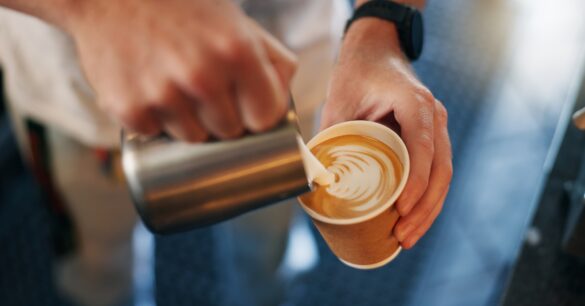In the heart of Tel Aviv, a café buzzes with activity. Baristas craft lattes while customers chat with one another, work quietly on their laptops and enjoy a good cup of brown brew.
But Café Otef isn’t just another coffee shop – it’s a chain of stores that represents a powerful story of resilience and community support in the wake of national tragedy.
“I felt that I had to do something,” says Tamir Barelko, the 50-year-old founder of Café Otef.
An Air Force veteran and successful restaurateur, he searched for ways to help following the October 7, 2023, Hamas attacks in southwest Israel.
The catalyst was an unexpected phone call from Michal Tzion, an events organizer who would become Barelko’s business partner. She approached him with a simple idea: creating a meeting space for displaced residents of Gaza border communities (the “Gaza envelope” or otef in Hebrew) Netiv Ha’asara and Kibbutz Reim, who had relocated to Tel Aviv.
What began as a concept for a basic coffee station quickly evolved into something far more ambitious.
Let’s give them more hope
“Let’s try to do something that will give them more hope, more reason to wake up in the morning,” Barelko recalls thinking.
Drawing on his three decades of experience in the food and beverage industry, he envisioned a place where Tel Aviv’s community could embrace their displaced neighbors while creating sustainable employment opportunities.
The first Café Otef opened in Tel Aviv’s Sarona Market in November 2023. But getting there wasn’t simple.
Initially, the communities were hesitant — and understandably so: they had just been at the epicenter of one of the most tragic national events in Israeli history.
“They thought, ‘Why? We’re not able to right now,’” Barelko remembers. Yet through persistence and careful planning, the concept took root.
Hybrid model
What makes Café Otef unique is its hybrid model of donation and sustainable business.
Rather than simply providing aid, the initiative gives communities ownership of their respective branches and provides comprehensive training in everything from coffeemaking to profit and loss management.
“We’re not giving them the fish,” Barelko explains, using a familiar metaphor. “We’re giving them the fishing rod.”
“We’re not giving them the fish; we’re giving them the fishing rod.”
The success has been remarkable. Each location employs approximately 20 people from affected communities. While the first pop-up café in Sarona Market has since closed, the initiative has expanded to include branches in Florentin (South Tel Aviv) and Sderot.
Another branch is planned to open later this year in Rosh Pina in the Galilee, which will employ displaced community members from Kiryat Shmona.
Café Otef boasts a successful merchandise line, which includes wines, jellies, honey, beer, pottery and art produced in Israel’s southern communities. The chain’s line of apparel has also seen major success; thousands of t-shirts were sold in the first month alone.
Corporate support has followed. Companies like Bank HaPoalim and various tech firms provide backing for new locations.
But Barelko emphasizes that success isn’t just measured in financial terms. “We understand that we have something [valuable] on our hands,” he says, describing how the cafés have become spaces of healing and community building.
Food trucks
Now, Café Otef is entering a new phase. Barelko’s focus is shifting to include disabled IDF veterans, with plans for food truck operations that will provide business opportunities for wounded soldiers.
His motivation to help this demographic runs deep – his own father was a disabled veteran who spent a year in Egyptian prison during Israel’s War of Independence. He explains that, for him, this is a way to come full circle — he uses the Hebrew phrase lisgor ma’agal, closing a circle — by giving disabled veterans a great opportunity to thrive.
“In the 50s or 60s, disabled veterans were given two employment options: get a job at a gas station or get a taxi license. This was many years ago — and that [system] doesn’t exist anymore. But now I feel that I will take the next step,” he says.
“I will find a way to give disabled people the potential to make money, a reason to wake up and a place to tell their stories. They are going to be the heroes of our country.”
The initiative might even go global, with discussions underway about potential locations in New York and Miami.
But at its core, Café Otef remains a testament to Israeli solidarity. “I feel that we have the best country in the world,” Barelko reflects. “I feel that we’re all partners. We’re a community.”
As customers continue to stream through the café’s doors, it’s clear that what Barelko and his team have created extends far beyond serving coffee. They’ve built a model for how business innovation can address social needs while fostering dignity and hope.
For Barelko, this mission feels like the culmination of his life’s journey.
“All my life, the process was leading to this,” he says. “To do something that I feel will stay here forever, in our hearts.”

